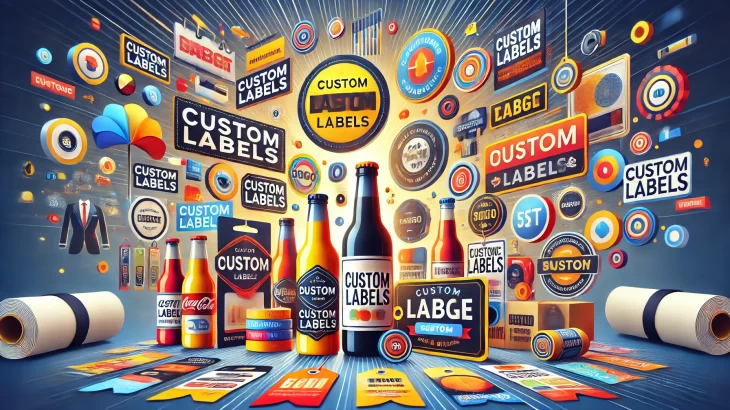The Role of Custom Labels play a vital role in branding and marketing. They are not just pieces of paper or stickers; they are powerful tools that communicate a brand’s identity, attract customers, and make products stand out on the shelf. This article explores how custom labels impact branding and marketing, helping businesses succeed in a competitive market.
What Are Custom Labels?
Custom labels are designed specifically for a product or brand. Unlike generic labels, they are unique, featuring the brand’s logo, colors, and style. These labels give products a professional and personalized touch, making them more appealing to customers.
Why Are Custom Labels Important for Branding?
Branding is about creating a unique identity that customers recognize and trust. Custom labels help achieve this in several ways:
- Creating a Strong First Impression
When a customer sees a product, the label is often the first thing they notice. A well-designed custom label can grab their attention and make a lasting impression. - Communicating Brand Values
Labels tell a story about the brand. For example, an eco-friendly brand might use labels made from recycled materials with earthy colors to reflect its commitment to sustainability. - Building Brand Recognition
Consistent use of logos, fonts, and colors on labels helps customers recognize the brand easily. Over time, this familiarity builds trust and loyalty.
The Marketing Power of Custom Labels
Custom labels are also essential for marketing. They influence customer decisions and enhance product appeal:
- Attracting Attention
In a crowded marketplace, eye-catching labels can make a product stand out. Bright colors, unique shapes, or creative designs draw customers in and encourage them to learn more about the product. - Providing Information
Labels often include important details like ingredients, instructions, or benefits. Clear and well-organized information can help customers make informed decisions. - Encouraging Purchases
A professionally designed label suggests high quality and value. Customers are more likely to buy a product that looks appealing and trustworthy. - Boosting Brand Engagement
Adding QR codes or social media links to labels allows customers to connect with the brand online. This can lead to more engagement and repeat purchases.
Custom Labels and Product Differentiation
In competitive markets, it’s essential to stand out. Custom labels help differentiate products in the following ways:
- Unique Designs
A custom label can reflect the product’s uniqueness. For example, a handmade soap might feature a rustic label design to emphasize its artisanal quality. - Tailored Messaging
Custom labels allow brands to target specific audiences. A sports drink label might focus on energy and hydration, appealing to athletes and fitness enthusiasts. - Seasonal Themes
Labels can be customized for holidays or special events. Seasonal designs create excitement and encourage impulse buys.
How to Design Effective Custom Labels
Creating a successful custom label requires careful planning. Here are some tips:
- Know Your Audience
Understand your target customers. A luxury perfume label should look elegant, while a children’s snack label might feature bright colors and playful designs. - Keep It Simple
A cluttered label can confuse customers. Focus on the most important information and use clean, readable fonts. - Use Quality Materials
High-quality materials make labels durable and professional-looking. A poorly made label can damage the brand’s image. - Be Consistent
Ensure the label design aligns with the brand’s overall look and feel. Consistency across all products strengthens brand identity.
Real-Life Examples of Custom Label Success
- Craft Breweries
Many craft breweries use creative labels to tell stories about their beer. Unique designs and clever names attract customers and set them apart from competitors. - Organic Food Brands
Organic brands often use earthy colors and recyclable materials on their labels to highlight their commitment to sustainability. This resonates with eco-conscious consumers. - Small Businesses
Small businesses use custom labels to add a personal touch to their products, making them more memorable to customers.
The Future of Custom Labels
As technology evolves, custom labels are becoming even more innovative. Digital printing allows for high-quality, cost-effective label production. Features like QR codes and augmented reality are being added to engage customers in new ways.
Sustainability is another key trend. Many brands are switching to eco-friendly label materials to meet customer demand for greener products.
Conclusion
Custom labels are a powerful tool for branding and marketing. They create a strong first impression, communicate brand values, and help products stand out. In a world where customers have endless choices, custom labels can make the difference between a product being noticed or overlooked. For businesses of all sizes, investing in custom labels is a step toward building a successful brand and reaching more customers.
